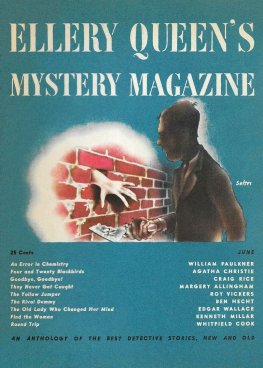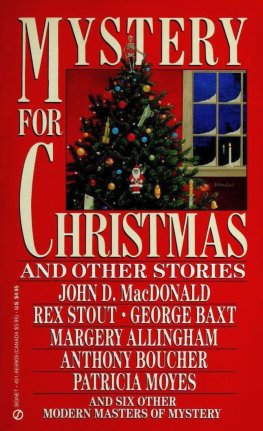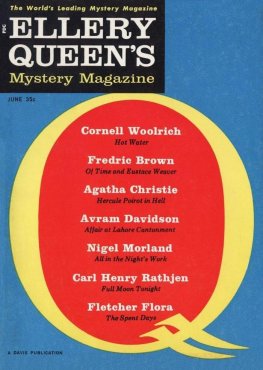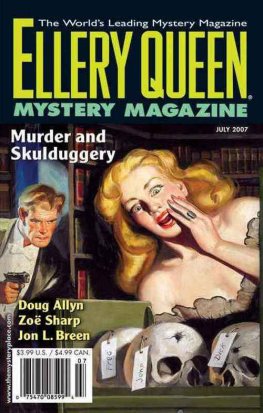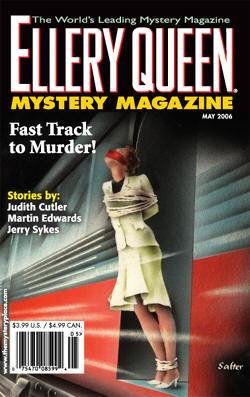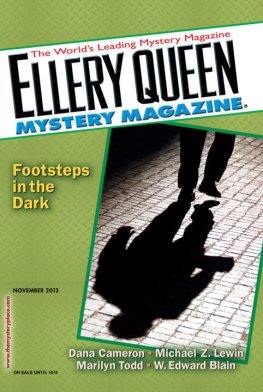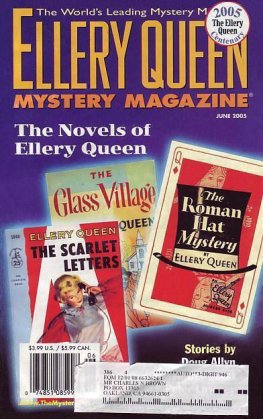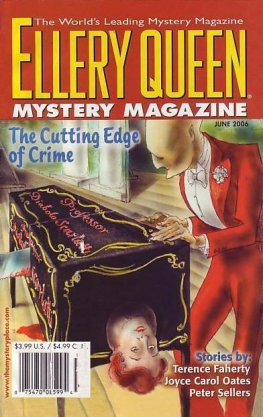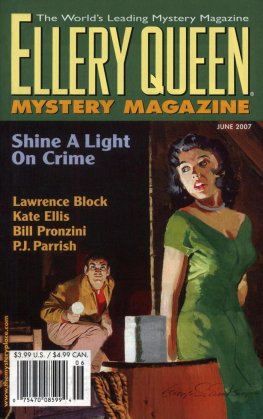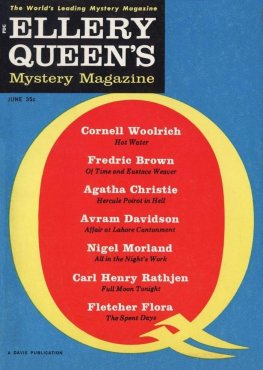Mardzheri Allingem - Ellery Queen’s Mystery Magazine. Vol. 7, No. 31, June 1946
Here you can read online Mardzheri Allingem - Ellery Queen’s Mystery Magazine. Vol. 7, No. 31, June 1946 full text of the book (entire story) in english for free. Download pdf and epub, get meaning, cover and reviews about this ebook. City: New York, year: 1946, publisher: The American Mercury, genre: Detective and thriller. Description of the work, (preface) as well as reviews are available. Best literature library LitArk.com created for fans of good reading and offers a wide selection of genres:
Romance novel
Science fiction
Adventure
Detective
Science
History
Home and family
Prose
Art
Politics
Computer
Non-fiction
Religion
Business
Children
Humor
Choose a favorite category and find really read worthwhile books. Enjoy immersion in the world of imagination, feel the emotions of the characters or learn something new for yourself, make an fascinating discovery.
- Book:Ellery Queen’s Mystery Magazine. Vol. 7, No. 31, June 1946
- Author:
- Publisher:The American Mercury
- Genre:
- Year:1946
- City:New York
- Rating:5 / 5
- Favourites:Add to favourites
- Your mark:
- 100
- 1
- 2
- 3
- 4
- 5
Ellery Queen’s Mystery Magazine. Vol. 7, No. 31, June 1946: summary, description and annotation
We offer to read an annotation, description, summary or preface (depends on what the author of the book "Ellery Queen’s Mystery Magazine. Vol. 7, No. 31, June 1946" wrote himself). If you haven't found the necessary information about the book — write in the comments, we will try to find it.
Mardzheri Allingem: author's other books
Who wrote Ellery Queen’s Mystery Magazine. Vol. 7, No. 31, June 1946? Find out the surname, the name of the author of the book and a list of all author's works by series.
Ellery Queen’s Mystery Magazine. Vol. 7, No. 31, June 1946 — read online for free the complete book (whole text) full work
Below is the text of the book, divided by pages. System saving the place of the last page read, allows you to conveniently read the book "Ellery Queen’s Mystery Magazine. Vol. 7, No. 31, June 1946" online for free, without having to search again every time where you left off. Put a bookmark, and you can go to the page where you finished reading at any time.
Font size:
Interval:
Bookmark:
Ellery Queens Mystery Magazine. Vol. 7, No. 31, June 1946

An Error in Chemistry
by William Faulkner
According to many European critics the four outstanding contemporary novelists in America are Ernest Hemingway, John Steinbeck, John Dos Passos, and William Faulkner. Only one of these great modern writers submitted a short story to EQMMs first prize contest William Faulkner, whose An Error in Chemistry was awarded one of the second prizes. It is only fair to say that while in the final balloting William Faulkner failed by a single vote to win the first prize, his story represented, in the opinion of at least two of the judges, the most distinguished writing in all 838 manuscripts entered in the first EQMM contest.
But that is not surprising: William Faulkner has never written any prose that did not bear the unmistakable mark of literary distinction. It has been said of Faulkner that in reality he is a split literary personality: that there are two Faulkners, one a stylized and morbid mystic, and the other a sharp and brilliant narrator. Surely the dichotomy of Faulkner s talent is confirmed in An Error in Chemistry: this strange story of almost pure detection is stylized, morbid, mystical, and sharply and brilliantly narrated. It has also been said of Faulkner that his work is in the tradition of Poe and Ambrose Bierce: that it reflects the technical ingenuity and horror of those two masters of natively American prose. The kinship of Faulkner, Poe, and Bierce is scalpel-keen critical insight; its fundamental truth grows on you.
Now, in reading An Error in Chemistry, we can pin down, isolate, another literary kinship this one wholly in the detective-story genre. For the first time your Editor perceives a relationship between William Faulkner and Melville Davisson Post, between the creator of Uncle Gavin, the protagonist in An Error in Chemistry, and Uncle Abner, the protagonist in the finest book of detective short stories written by any American author since Poe.
To begin with, there are superficial affinities: it is an amazing coincidence that both detectives are avuncular, referred to only by the title Uncle Uncle Abner and Uncle Gavin. It is an equally amazing extension of the same coincidence that both characters are seen through the eyes of similar Watsons young, anonymous nephews. These parallels are all the more remarkable when we consider that William Faulkner probably never read an Uncle Abner story in all his life indeed, probably never even heard of Uncle Abner.
The richness of kinship, however, digs deeper: both Faulkner and Post realize fully their material. The two characters emerge with grandeur: both are imbued with an inordinate consciousness and appreciation of justice; both speak and think in an aura of mysticism; both are stalwart men, ethically, religiously, humanitarily. True, the times and the backgrounds are utterly different: Posts Uncle Abner was the protector of the innocent and righter of wrongs, the voice and arm of the Lord, in early 19th century Virginia; Faulkners Uncle Gavin is a present-day Phi Beta Kappa Harvard man, county attorney in the back-country of the deep South. But both the characters, the backgrounds, and the moods of the storytelling are thoroughly American in spirit and style.
Who would have dreamed that William Faulkner of all the writers in America would, by accident or design, carry on the legend of Uncle Abner, create a modern Uncle Gavin in the great tradition? We can only hope that Mr. Faulkner will prolong the saga, continue to mould it in the purest detective vein, and send further exploits of Uncle Gavin to your Editor. Indeed, we would be honored if from now on Mr. Faulkner would consider EQMM his crime-story crucible and detective-story domicile.
* * *It was Joel Flint himself who telephoned the sheriff that he had killed his wife. And when the sheriff and his deputy reached the scene, drove the twenty-odd miles into the remote back-country region where old Wesley Pritchel lived, Joel Flint himself met them at the door and asked them in. He was the foreigner, the outlander, the Yankee who had come into our county two years ago as the operator of a pitch a lighted booth where a roulette wheel spun against a bank of nickel-plated pistols and razors and watches and harmonicas, in a traveling street carnival and who when the carnival departed had remained, and two months later was married to Pritchels only living child: the dim-witted spinster of almost forty who until then had shared her irascible and violent-tempered fathers almost hermit-existence on the good though small farm which he owned.
But even after the marriage, old Pritchel still seemed to draw the line against his son-in-law. He built a new small house for them two miles from his own, where the daughter was presently raising chickens for the market. According to rumor old Pritchel, who hardly ever went anywhere anyway, had never once entered the new house, so that he saw even this last remaining child only once a week. This would be when she and her husband would drive each Sunday in the second-hand truck in which the son-in-law marketed the chickens, to take Sunday dinner with old Pritchel in the old house where Pritchel now did his own cooking and housework. In fact, the neighbors said the only reason he allowed the son-in-law to enter his house even then was so that his daughter could prepare him a decent hot meal once a week.
So for the next two years, occasionally in Jefferson, the county seat, but more frequently in the little cross-roads hamlet near his home, the son-in-law would be seen and heard too. He was a man in the middle forties, neither short nor tall nor thin nor stout (in fact, he and his father-in-law could easily have cast that same shadow which later for a short time they did), with a cold, contemptuous intelligent face and a voice lazy with anecdote of the teeming outland which his listeners had never seen a dweller among the cities, though never from his own accounting long resident in any one of them, who within the first three months of his residence among them had impressed upon the people whose way of life he had assumed, one definite personal habit by which he presently became known throughout the whole county, even by men who had never seen him. This was a harsh and contemptuous derogation, sometimes without even provocation or reason or opportunity, of our local southern custom of drinking whiskey by mixing sugar and water with it. He called it effeminacy, a pap for children, himself drinking even our harsh, violent, illicit and unaged homemade corn whiskey without even a sip of water to follow it.
Then on this last Sunday morning he telephoned the sheriff that he had killed his wife and met the officers at his father-in-laws door and said: I have already carried her into the house. So you wont need to waste breath telling me I shouldnt have touched her until you got here.
I reckon it was all right to take her up out of the dirt, the sheriff said. It was an accident, I believe you said.
Then you believe wrong, Flint said. I said I killed her.
And that was all.
The sheriff brought him to Jefferson and locked him in a cell in the jail. And that evening after supper the sheriff came through the side door into the study where Uncle Gavin was supervising me in the drawing of a brief. Uncle Gavin was only county, not District, attorney. But he and the sheriff, who had been sheriff off and on even longer than Uncle Gavin had been county attorney, had been friends all that while. I mean friends in the sense that two men who play chess together are friends, even though sometimes their aims are diametrically opposed. I heard them discuss it once.
Font size:
Interval:
Bookmark:
Similar books «Ellery Queen’s Mystery Magazine. Vol. 7, No. 31, June 1946»
Look at similar books to Ellery Queen’s Mystery Magazine. Vol. 7, No. 31, June 1946. We have selected literature similar in name and meaning in the hope of providing readers with more options to find new, interesting, not yet read works.
Discussion, reviews of the book Ellery Queen’s Mystery Magazine. Vol. 7, No. 31, June 1946 and just readers' own opinions. Leave your comments, write what you think about the work, its meaning or the main characters. Specify what exactly you liked and what you didn't like, and why you think so.

